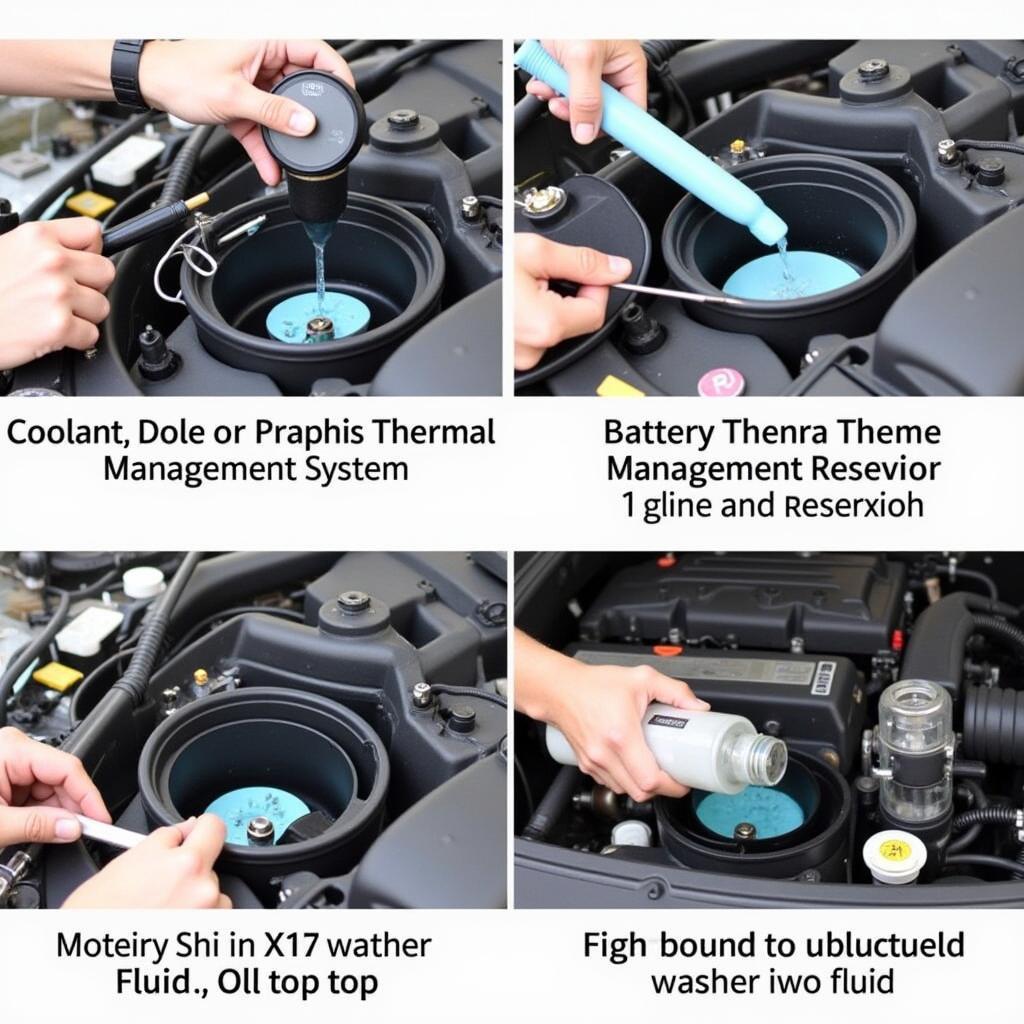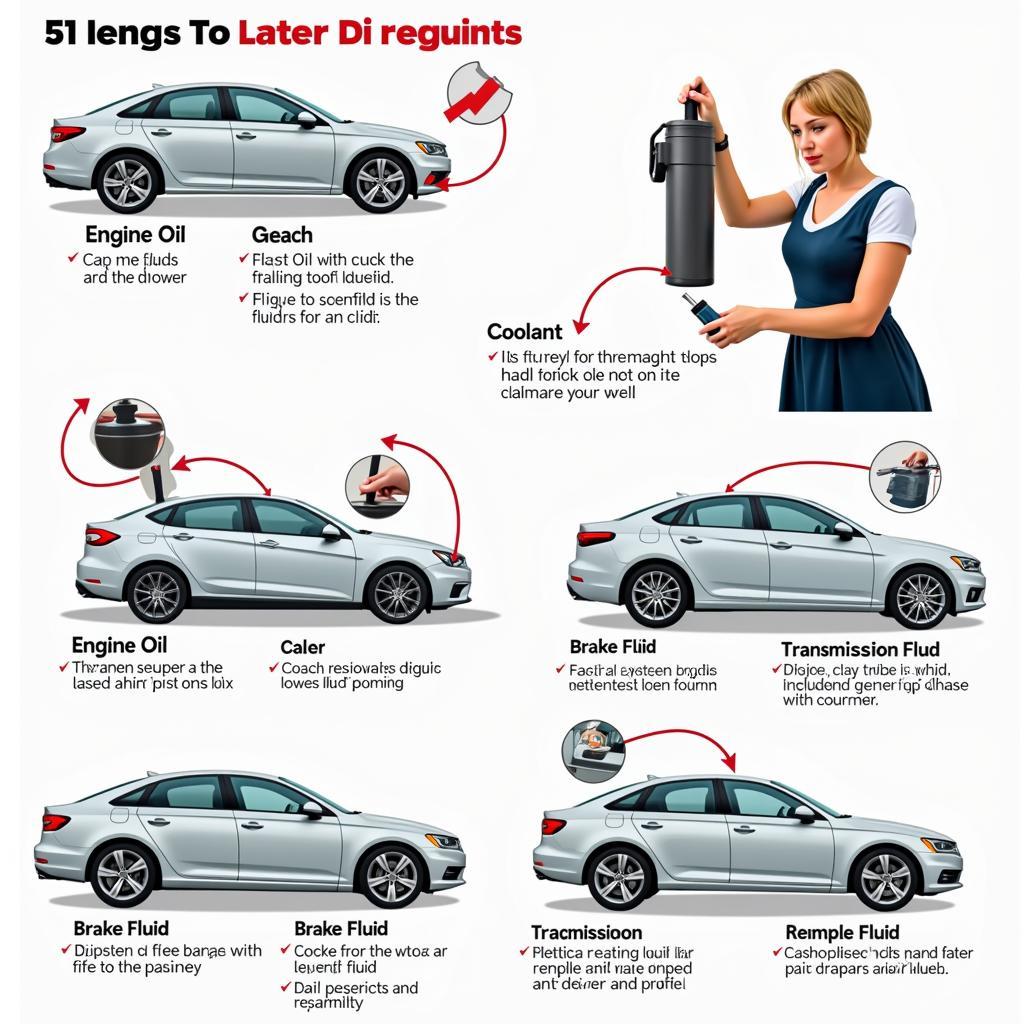Electric cars are revolutionizing the automotive industry, offering a cleaner and quieter driving experience. But what about maintenance? One of the biggest draws for potential EV owners is the perceived lower maintenance compared to traditional gasoline vehicles. This is largely true, but understanding What Maintenance Is Need For An Electric Car is crucial for long-term performance and reliability.
For those transitioning from gas-powered cars, electric car maintenance might seem surprisingly simple. There are no oil changes, spark plugs, or fuel filters to worry about. This translates to significant cost savings over the lifespan of the vehicle. However, electric cars do require specific care, and understanding these needs will keep your EV running smoothly for years to come. This guide covers everything you need to know about what kind of maintenance does a electric car need, ensuring you’re equipped to handle your EV’s upkeep. If you’re curious about the differences between maintaining an electric car versus a gasoline car, check out this insightful comparison: electric car vs gasoline car maintenance.
Key Maintenance Areas for Electric Cars
While EVs require less frequent maintenance, several key areas still need attention. These include the battery pack, brakes, tires, fluids, and software updates.
Battery Care: The Heart of Your EV
The battery pack is the most crucial component of an electric car. Proper care ensures optimal range and lifespan. Avoid consistently charging to 100% or letting the battery deplete to 0%, as this can stress the battery and reduce its lifespan.
-
Thermal Management: Extreme temperatures can impact battery performance. Park in shaded areas during hot weather and consider pre-conditioning the battery in cold climates.
-
Charging Habits: Utilizing Level 2 charging at home is generally recommended over frequent fast charging, which can generate excess heat and potentially degrade the battery over time.
Brake Maintenance: Regenerative Braking and Its Impact
Electric cars utilize regenerative braking, which captures energy during deceleration and feeds it back to the battery. This reduces wear and tear on the traditional friction brakes. However, regular inspection of the brake pads, rotors, and fluid is still necessary.
-
Brake Fluid: Check and replace brake fluid as recommended by the manufacturer, typically every 2-3 years.
-
Brake Pad Inspection: Though they wear slower than in gasoline cars, brake pads still require periodic inspection and eventual replacement.
Tire Maintenance for Electric Vehicles: Weight and Torque Considerations
Electric cars are often heavier than gasoline counterparts due to the battery pack. This, combined with the instant torque delivery of electric motors, can increase tire wear. Regular tire rotations and maintaining proper tire pressure are crucial for even wear and optimal efficiency.
-
Tire Rotation: Follow the manufacturer’s recommended tire rotation schedule.
-
Tire Pressure: Check tire pressure regularly and adjust as needed. Proper inflation contributes to optimal range and handling.
Fluids and Coolants: Beyond the Battery
While EVs don’t have engine oil, they still require other fluids like coolant for the battery thermal management system and windshield washer fluid. These should be checked and topped off as needed.
-
Coolant: The battery thermal management system relies on coolant to maintain optimal operating temperature. Regular checks and top-offs are important.
-
Windshield Washer Fluid: Just like in any car, maintain an adequate level of windshield washer fluid for clear visibility.
 Checking Fluids in an Electric Vehicle – Coolant and Windshield Washer
Checking Fluids in an Electric Vehicle – Coolant and Windshield Washer
Software Updates: Keeping Your EV Up-to-Date
Modern electric cars rely heavily on software for various functions, including battery management, performance, and safety features. Regular software updates from the manufacturer are essential for optimal performance and to address any potential bugs or security vulnerabilities. Think of these updates like you would for your smartphone or computer. Staying current is vital for a smooth and secure driving experience. This is one area where electric car maintenance differs significantly from gasoline cars. You can learn more about the specific maintenance needs of electric cars here: [what kind of maintenance does a electric car need](http://autotippro.com/what-kind of-maintenance-does-a-electric-car-need/).
Does Electric Car Need Any Kind of Maintenance? Yes, But It’s Different.
While the maintenance needs of an electric car are different from those of a gasoline car, regular upkeep is still essential. By focusing on these key areas—battery care, brakes, tires, fluids, and software updates—you can ensure the long-term health, performance, and value of your electric vehicle. For those curious about the types of maintenance required, what type of maintenance does an electric car need offers further information.
Conclusion: Embracing the Electric Future with Proper Care
Understanding what maintenance is need for an electric car is paramount for enjoying the many benefits of EV ownership. While simpler than maintaining a gasoline car, electric car maintenance requires a different approach. By following the outlined guidelines and staying informed about your specific EV model’s requirements, you can maximize its lifespan, performance, and overall value. For all your electric car maintenance needs and expert advice, contact AutoTipPro at +1 (641) 206-8880 or visit our office at 500 N St Mary’s St, San Antonio, TX 78205, United States. We’re here to help you navigate the electric future with confidence. You can also find more information and news regarding electric car maintenance at what kind of maintenance does an electric car news.
 Electric Car Maintenance in the Future – Advanced Diagnostics and Technology
Electric Car Maintenance in the Future – Advanced Diagnostics and Technology
FAQ
-
How often do I need to charge my electric car? This depends on your driving habits and the vehicle’s range. Most EVs can be charged daily or every few days, depending on usage.
-
Do electric car batteries need to be replaced? EV batteries are designed to last for many years, often exceeding the lifespan of the vehicle itself. However, they may eventually need replacement depending on usage and degradation.
-
Are electric cars more expensive to maintain than gasoline cars? Generally, electric cars are less expensive to maintain due to the absence of many traditional engine components that require regular servicing.
-
What is regenerative braking? Regenerative braking captures energy during deceleration and feeds it back to the battery, increasing range and reducing brake wear.
-
Where can I get my electric car serviced? You can get your electric car serviced at authorized dealerships or specialized EV repair shops.
-
Do electric cars require special tires? While not strictly required, some tires are specifically designed for EVs, offering lower rolling resistance for improved efficiency.
-
Are there any government incentives for electric car maintenance? Depending on your location, there may be incentives or rebates available for EV maintenance or repairs. Check with your local government for details.





Leave a Reply